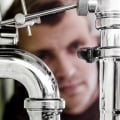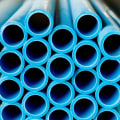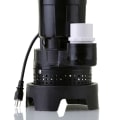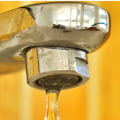When it comes to plumbing maintenance, it's important to inspect and maintain your septic system, as well as repair any appliances that use water, such as water heaters, washing machines, and dishwashers. Not only can pipe leaks affect pipes and water pressure, but they can also cause damage to your home. Over time, shower heads can become clogged with mineral deposits, making them less effective or even blocking them completely. To remove these deposits, unscrew the shower heads and immerse them in vinegar for 24 hours.
If that doesn't work, it's time to replace the shower head. As a general guideline for homeowners, it's recommended to inspect and maintain your plumbing system every two years for newer systems. If you live in an older home or have needed frequent adjustments or repairs throughout the year, an annual plumbing maintenance program would be best. There are several benefits to regular plumbing maintenance, including lower bills for major repairs and avoiding the inconvenience of drains not draining or sewer pipes re-entering your home. The kitchen is one area where there is a direct impact on plumbing; specifically, the sink drain, the garbage disposal, and the dishwasher.
To keep pipes clean and minimize strain on your plumbing system, avoid throwing grease and other oils down the drain; bath oils smell great but leave residue inside the pipes. Additionally, place a mesh over the drain to catch hair. It's easy to overlook drains and sewer lines since you can't see them; however, slow drains are one of the first signs your plumbing system sends when there's a problem. Maintenance sometimes involves draining and discharging the water heater. If you have purchased a plumbing maintenance plan, read the small print and always ask for clarification.
Maintenance can also include inspecting the pipes (and units) of the garbage disposal, dishwasher, and hoses and pipes of the washing machine. Rust, deformation, and water droplets on the outside of pipes indicate a problem that a qualified plumber should fix. A leaking faucet wastes up to eight gallons of water a day; a functioning toilet can waste up to 200 gallons of water per day. Garbage shredders, refrigerators, dishwashers, water heaters, and washing machines are potential sources of small leaks that can cause costly damage and costly repair bills. If you use these household plumbing maintenance tips regularly, you can keep your pipes working properly so you won't have to call a plumber as often. Most plumbing repairs are best left to licensed plumbers but you can use simple home plumbing maintenance tips to reduce the need for one.
When you schedule routine plumbing maintenance, your local plumber performs a thorough review of your plumbing system and components. There are now more plumbers offering service contracts so if you signed one, read it to see if it covers any signs you've noticed. When it comes down to it, most homeowners will experience some kind of plumbing problem at some point that requires the services of a licensed plumber.




Leave a Comment